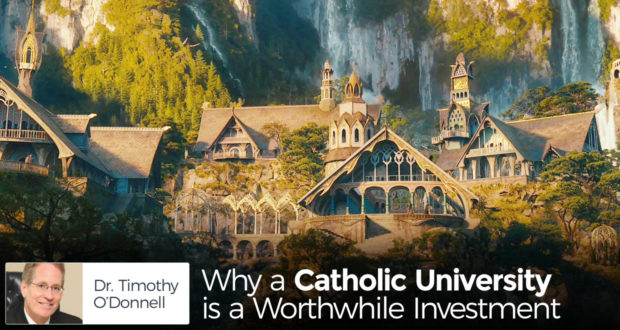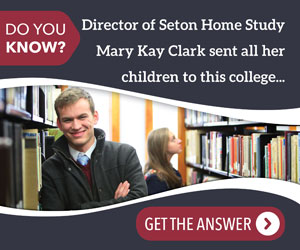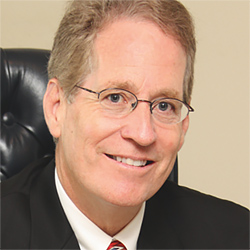Summary
Dr Timothy O’Donnell, President of Christendom College, likens a Catholic college to a formative respite in Rivendell before engaging the modern culture.In this age where slanted opinions are taught as facts and the truth is hidden behind cultural lies in the name of political correctness, the importance of forming blossoming adults in the Faith cannot be overlooked.
Their final but fundamental phase of leaving childhood behind and entering the reality of adult life influences much of who they become and what kind of impact they have.
As parents, it is hard to help them through this stage; it is important to give them their independence, but they still seem to need so much guidance.
The Catholic university fulfills this role, nourishing and strengthening each generation as they become men and women “in the world, but not of it” (cf. John 15:19).
Through the guidance of faithful professors and the encouragement of true friends, the Catholic university leads its students to embrace the fullness of truth, a truth they can trust because it is built on the teachings of Christ and His Church.
Education in the Tradition of the Church
The importance of exposing these quickly-maturing children to a Catholic educational environment has been consistently affirmed by the leaders of the Church.
Pope Leo XIII in his encyclical Spectata Fides (On Christian Education) advises the faithful to entrust the formation of their children to Catholic schools, where their children are made faithful disciples and valuable citizens:
“for it is in and by these schools that the Catholic faith, our greatest and best inheritance, is preserved whole and entire; it is by these schools that good citizens are brought up for the State.” (SF 4)
Pope St. John Paul II affirmed this sentiment over one hundred years later, declaring that at a Catholic university
“the students are educated in the various disciplines so as to become truly competent in the specific sectors in which they will devote themselves to the service of society and of the Church, but at the same time prepared to give the witness of their faith to the world.” (Ex Corde Ecclesia 15)
The approach to education as an effort to form people in every respect, thus helping them become the best versions of themselves, was highlighted by Pope Francis when he addressed the Vatican Congregation for Catholic Education last February.
He said, “Catholic educational institutions offer to all an approach to education that has as its aim the full development of the person, which responds to the right of every person to [have] access to knowledge,” every person’s right to find fulfillment in his Creator and in the joy that comes with following his calling to the best of his abilities.
Pope Emeritus Benedict XVI eloquently pointed to the immense value of a Catholic education in an address at Catholic University of America in April 2008. He called this education an integral part of learning how to become more human, more truly oneself, through the freedom that faith in God informed by wisdom provides:
“Only in the faith can truth become incarnate and reason truly human, capable of directing the will along the path of freedom (cf. Spe Salvi 23). In this way our institutions make a vital contribution to the mission of the Church and truly serve society.”
As the Popes realized, the education of Catholic adults must treat people as body-soul composites. This means it is of the greatest importance to both augment their intellectual knowledge so that they can better understand society, and to guide their souls to make choices which will lead them to greater happiness, found in Christ.
The modern age does not want to address man’s higher desires, his holier instincts, his deeper needs.
The age has forgotten that God made man “little less than a god” (cf. Psalm 8:6), and wants man to believe he is an animal whose base urges should never be denied.
It is this society, which raises its children to think so little of themselves, that needs well-formed adults the most.
The Last Homely House
In J.R.R. Tolkien’s The Hobbit, the main characters are on a dangerous but important journey; after they finish the first phase, which was challenging in its own way but overall relatively safe, they pause to stay with the elves at the “Last Homely House.” It is a place of beauty, light, wisdom, joy, and friends. It lingers like a lighthouse before the turbulent sea, the final little place of security and trust before the edges of wilderness.
Much like the first phase of the characters’ journey, childhood has its own difficulties and many growing pains, but ultimately is safe. There are many guardians keeping watch over those in that phase of the journey.
But then the time comes to plunge into that wilderness and be a shining light of truth in a world tangled in webs of deceit.
The Catholic university is the “last homely house” standing firm and bright before the corrupting world. It has everything the child needs to complete his formation before he sets out into that world to be a light to others, and remain shining himself.
He must go—God is calling him to be a witness in a world so desperately in need of evangelization.
Through his education he will become equipped to serve society by using his knowledge to excel in any field to which he applies himself, while simultaneously pointing others to God through his actions and his faith.
At Christendom College, we strive to be exactly that: a final place of beauty and formation where students are given everything they need to succeed in the world ahead of them. At Christendom each student is educated in a core curriculum of liberal arts, consisting of Theology, History, Literature, Philosophy, Foreign Languages, Mathematics, and Science.
No matter which major they choose, the students are thus formed on such a strong intellectual foundation that they excel in any major and every field to which they apply themselves.
Our one-of-a-kind and time-tested education has proven an excellent transition for home-educated students.
Many Seton Home Study students have been salutatorian and valedictorian at our commencements—this is no small feat.
Complementary to this educational background, Christendom provides an abundance of spiritual resources and makes it convenient for students to access them.
These resources range from three different daily Mass times to talks given on various spiritual topics throughout the week, from daily Rosary, Adoration, and Liturgy of the Hours, to Discernment Weekends and spiritual retreats.
The combination of intellectual and spiritual resources is essential to this phase of life and is a natural extension of the domestic Church that parents have worked so hard to develop.
A Priceless Education
Some may object and say college is not worth the investment, but it begs the question: if helping a child’s transition into adulthood become a beautiful affirmation of his faith and his personal worth (rather than a falling away from it) is not worth it, what is?
Pope Saint John Paul II declared that “a Catholic University offers an indispensable contribution to the Church” (Ex Corde Ecclesia 31, emphasis added).
As Catholics striving to remain faithful in a falling world, any contribution necessary for the Church is equally necessary for her children, for the children of every Catholic family who hopes to raise children that will carry on the Faith. Both Christendom College and Seton Home Study were founded by the Carroll family.
Concerned about the state of education in America, and wanting to provide an education that would form the minds and souls of students, rather than corrupt them as so many modern universities do, Anne Carroll founded Seton, while her husband, Dr. Warren Carroll, started a college.
Christendom understands the importance of sacrificing a little to gain much. Each year, we work to create a country full of more students who are strengthened in faith and knowledge, rather than lost to secularism and false teachings.
The Catholic university is here for the children of the Church, to guide them and help them find their wings. They come in children and leave adults, strengthened in knowledge and virtue.
When they leave the nest, the lessons instilled in them during childhood, which they adopted as their own through college, become the wind beneath their wings.
Then their parents and their teachers can be at peace, knowing that their children will not fall, but rather soar and become the great saints God has called them to be.
Rivendell image Copyright NewLineCinemas

 Seton Magazine Catholic Homeschool Articles, Advice & Resources
Seton Magazine Catholic Homeschool Articles, Advice & Resources


